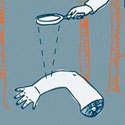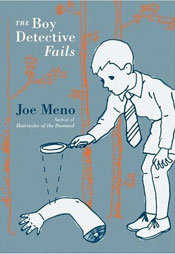
The Boy Detective Fails
by Joe Meno
Akashic Books

What happens when a famed boy genius grows up and has to deal with mysteries more puzzling than those involving masked phantoms or smugglers? Joe Meno’s The Boy Detective Fails uses this question as a jumping-off point for a haunting, heartbreaking work of fiction, which combines humor, surrealism, and post-modernist tomfoolery to an ultimately life-affirming and triumphant end.
For his tenth birthday, Billy Argo receives a True-Life Junior Detective Kit and immediately begins solving crime in his New Jersey town with his sister, Caroline, and pudgy friend, Fenton. The early portions of the book paint an idyllic childhood, full of mystery and adventure, while being a spot-on parody of kid detective books like The Hardy Boys, Nancy Drew, and Encyclopedia Brown, right down to the headlines trumpeting the cases the children solve, such as “Boy Detective Quiets the Mystery of the Singing Diamond” or “Boy Detective Solves Flying Saucer Hoax,” or to the character of Fenton, the fat sidekick that all kid detectives are required to have.
Jealousies and puberty threaten to split up the team, and the friends disband when Billy goes off to college. Caroline continues sleuthing for a while, but she lacks Billy’s natural talent and commits suicide after a case involving a terrible secret in an abandoned cave. Billy is institutionalized until age 30 and then has to deal with an office job, depression, and that there are mysteries even the most gifted ex-boy detective can not solve.
Meno’s previous novel, Hairstyles of the Damned, also evoked the feelings, hopes, and expectations of adolescence. The Boy Detective Fails, however, is a much stronger work and more streamlined, even at over 300 pages. Meno has an immensely readable, charming, and addictive style, with the ability to use elements of post-modernism and humor that would seem precious and grating in less capable hands and effortlessly integrate them as part of the story. Blocks of text are broken into designs, hidden puzzles pop up throughout the book, and chapters follow a seemingly random numbering system.
The elements of magical realism are also integrated well: nobody seems to notice the disappearing buildings, snowing light bulbs, or stars that spell out messages. Billy’s job as a moustache salesman also seems normal, turning what could have been a one-note joke into a realistic look at soul-deadening cubicle work. While the reader might think Meno will cop out in the end with Billy imagining the whole thing from the mental institution, the ending is hopeful and charmingly free of irony.
While calling a novel “cartoony” might seem like an insult, it applies to The Boy Detective Fails in that it evokes the melancholy, design, and wordplay of Chris Ware’s work, as well as the surrealism and barely controlled anarchy of early animated classics. The result is a strong work from a young author who deserves a wide audience.












